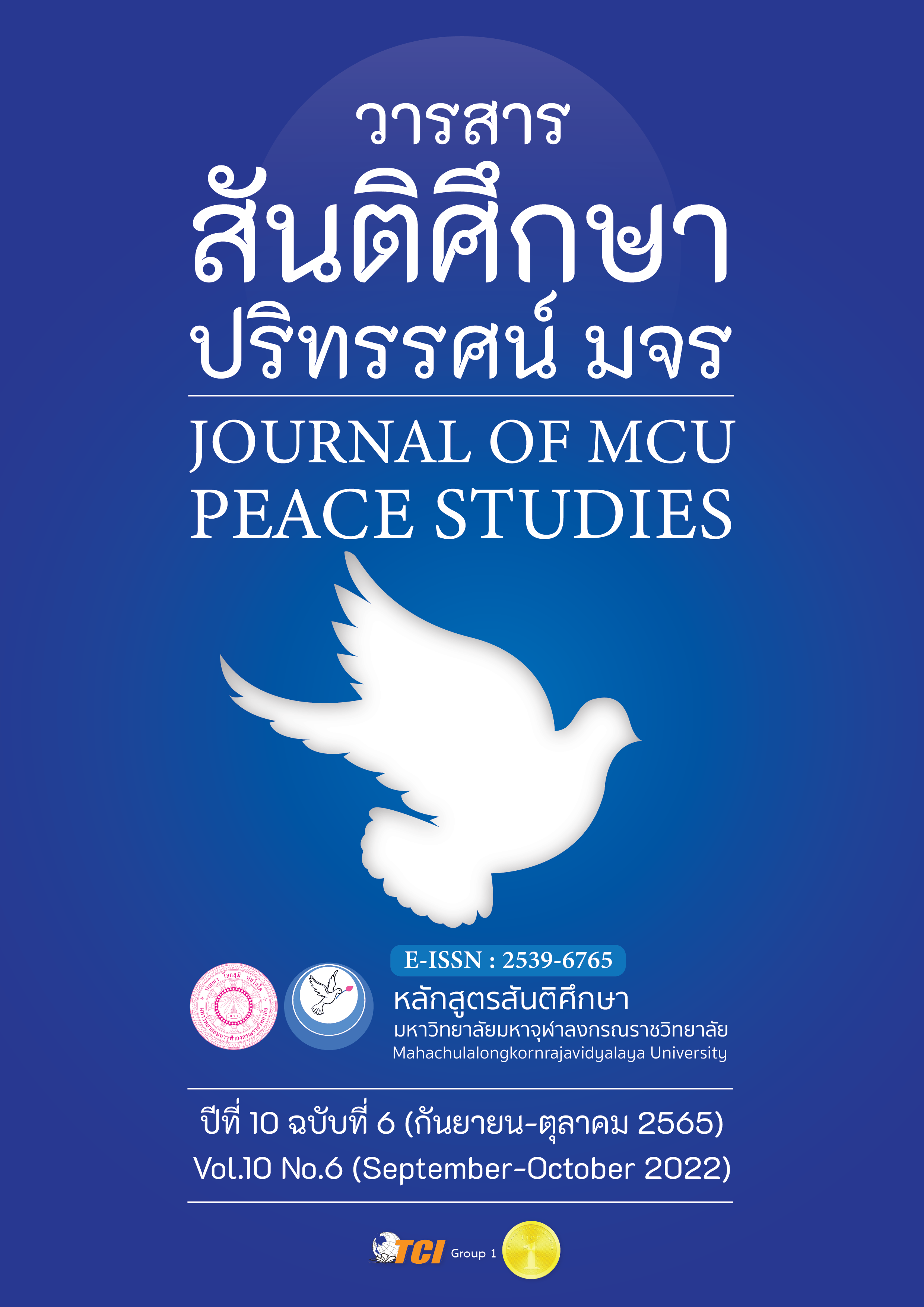พุทธจิตวิทยาเพื่อการพัฒนารูปแบบเสริมสร้างโพธิปัญญาพยาบาล
Main Article Content
บทคัดย่อ
บทความวิจัยนี้มีวัตถุประสงค์เพื่อ 1) ศึกษาวิเคราะห์องค์ประกอบพุทธจิตวิทยาการพัฒนารูปแบบเสริมสร้างโพธิปัญญาพยาบาล 2) พัฒนารูปแบบพุทธจิตวิทยาเสริมสร้างโพธิปัญญาพยาบาล 3) ประเมินรูปแบบพุทธจิตวิทยาเสริมสร้างโพธิปัญญาพยาบาล การวิจัยนี้ใช้ระเบียบวิธีวิจัยแบบ Multiple Method Methodology ประกอบด้วย วิจัยเชิงคุณภาพ ระเบียบวิธีวิจัยขั้นสูง การวิเคราะห์องค์ประกอบเชิงยืนยัน วิจัยเชิงปริมาณ การวิจัยกึ่งทดลอง
ผลการวิจัยพบว่า องค์ประกอบเชิงยืนยันของโพธิปัญญาพยาบาล ประกอบด้วย 4 องค์ประกอบ ได้แก่ หัวใจความกรุณา ใจตื่นรู้ ความหมายชีวิต การเข้าใจจิตวิญญาณ ผลวิเคราะห์องค์ประกอบเชิงยืนยันอันดับสอง มีความสอดคล้องกับข้อมูลเชิงประจักษ์ในระดับดี ค่าดัชนีความสอดคล้องกลมกลืน ประกอบด้วย ค่าไคสแควร์ X2 = 366.771, df = 209, p = 0.50, GFI = 0.939, AGFI = 0.920, RMSEA = 0.0395 รูปแบบพุทธจิตวิทยาเสริมสร้างโพธิปัญญา ประกอบด้วย 4 ขั้นตอน ได้แก่ 1) ขั้นเริ่มตัน 2) ขั้นพัฒนาจิต 3) ขั้นพัฒนากิจ 4) ขั้น ให้แนวทางดำเนินชีวิตด้วยมรรค แบ่งเป็น 13 กิจกรรมย่อย การประเมินประสิทธิผลของรูปแบบเสริมสร้าง โพธิปัญญา พบว่า กลุ่มทดลองมีคะแนนเฉลี่ยภาพรวมโพธิปัญญา สูงกว่า กลุ่มควบคุม ทั้งในระยะหลังทดลอง ระยะติดตามผลหลังทดลอง 1 เดือน และระยะติดตามผลหลังทดลอง 2 เดือน ผลการประเมินมีความถูกต้อง เหมาะสม เป็นไปได้ในการนำไปใช้ และมีประโยชน์ในระดับมากที่สุดทุกด้าน สรุปได้ว่ารูปแบบมีประสิทธิภาพสามารถนำไปใช้ได้จริง
Article Details

อนุญาตภายใต้เงื่อนไข Creative Commons Attribution-NonCommercial-NoDerivatives 4.0 International License.
ทัศนะและความคิดเห็นที่ปรากฏในบทความในวารสาร ถือเป็นความรับผิดชอบของผู้เขียนบทความนั้น และไม่ถือเป็นทัศนะและความรับผิดชอบของกองบรรณาธิการ ยินยอมว่าบทความเป็นลิขสิทธิ์ของวารสาร
เอกสารอ้างอิง
Aukkarapridie, R., & Satraphat, D. (2017). Study on the Behavior of Patient Care with Compassion and Love and the Spirit of Creative and Happy Living According to the Perception of Trained and Non-Trained Personal in Clinical Pastoral Education, A Case Study of Saint Mary's Hospital.VRU Research and Development. Journal Humanities and Social Science, 12(1), 301-307.
Chawaphanth, S. (2021). Nurse and Their Spirit of the Second Mile Service During Covid19 Pandemic. Thai Journal of Nursing Council, 36(1), 5-17.
Frankl, V. E. (1967). Logotherapy and Existentialism. Psychotherapy: Theory, Research & Practice, 4(3), 138-142.
Grewnak, N. (2012). Qualitative Data Analysis Technic: QDAT Knowledge. (Doctoral Dissertasion). Teaching Materials SWU Prasanmit. Bangkok.
Jantaweemuang, V., Balthip, K., & Petchruschatachart, U. (2018). Effect of Contemplative Education Program on Spiritual Well-Being of Nursing Students. Journal of Siam University, 19(37), 84-102.
Lintattanasirikul, K. (2011). Using Multivariate Analysis of Variance in Educational Research. Techniques for Educational and Psychological Research, 1(1), 198-210.
L. A. & Perlman, D. (Eds), Peplau. (1990). Loneliness: A Sourcebook of Current Theory, Research and Therapy. New York: Wiley-Interscience.
McSherry, W., Draper, P., & Kendrick, D. (2002). The Construct Validity of a Rating Scale Designed to Assess Spirituality and Spiritual Care. International Journal of Nursing Studies, 39(7), 723-734.
Phra Paisal Visalo. (2000). Calm, Cool and Helpful. Bangkok: Nation Book.
Phrakhrũ Pimolpaññãnuyut (Bhuñtã Indapaññã). (2020). A Buddhist Psychological Process of Self-Development for Awakening. Mess, 16(2), 261-596.
Reawtaisong, P., & Supwirapakorn. W. (2017). The Effects of Logotherapy on Meaning in Life of the Elderly with Cancer. Journal of the Police Nurses, 9(1), 47-58.
Rinpoche, S. (2018) The Art of Living and Dying. Retrieved June 26, 2018, from http://www.visalo.org/article/Nation5901_2.html.
Saengsakorn, P. (2012).The Synthesis of Body of Knowledge Related to Spiritual Well-Being in the Context of Thai Society. Journal of Behavioral Science, 18(1), 84-94.
Siwarat, S. (2017). Life Quality Development with the Threefold Training. National Defence Studies Institute Journal, 8(1), 36-48.
Tongprateep, T. (2000). One Dimensional Spirit, Nursing. Thailand: V.Print Company.
Watcharasin, S. (2017). Buddhist Modes of Thinking for Meritorious Acceleration Developing the Quality of Life Amongst Professional Nurses. Journal of Graduate Studies, 13(3), 67-79.


